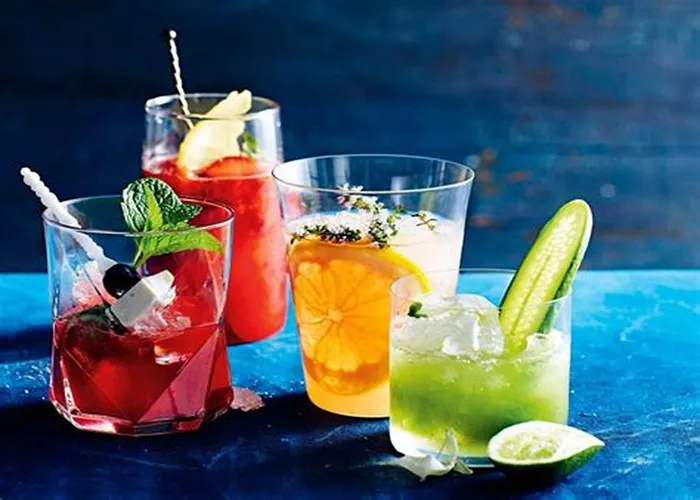When it comes to choosing between a cocktail or wine to start a meal or evening, there are a number of factors to consider. Both cocktails and wine have their own unique qualities and can set the tone for the rest of the dining experience. In this essay, we will explore the pros and cons of starting with a cocktail or wine, and provide guidance on how to make the best decision based on the occasion, menu, and personal preferences.
Cocktails: A Spirited Start
What Are Cocktails?
Cocktails are mixed drinks that typically combine spirits, liqueurs, mixers, and sometimes fruits or herbs. They come in a wide variety of flavors and styles, from refreshing and fruity to strong and complex.
Advantages of Starting with a Cocktail
1. Variety:
Cocktails offer an extensive range of flavors and combinations, allowing you to start your evening with something unique and exciting.
2. Mood Setting:
Depending on the cocktail, it can set a particular mood. For example, a tropical cocktail can bring a sense of relaxation and vacation vibes, while a classic martini can add an air of sophistication.
3. Appetite Stimulation:
Some cocktails, especially those with acidic or bitter elements, can stimulate the appetite and prepare your palate for the meal to come.
Considerations When Starting with a Cocktail
1. Strength:
Cocktails can be quite strong, so it’s important to be mindful of your alcohol intake. Starting with a potent cocktail might make you feel tipsy too quickly and affect your enjoyment of the rest of the evening.
2. Pairing with Food:
While some cocktails can pair well with certain dishes, they might not be as versatile as wine when it comes to complementing a full meal.
Examples of Cocktails for a Starter
1. Mojito:
With its refreshing combination of mint, lime, rum, and soda water, a mojito is a great choice for a warm summer evening. It’s light and not overly strong, making it a good option to start off.
2. Bellini:
A mixture of prosecco and peach puree, the Bellini is a classic cocktail that is perfect for brunch or a special occasion. Its fruity flavor and effervescence make it a delightful starter.
3. Negroni:
For those who prefer a more bitter and complex flavor, a Negroni is a great choice. Made with gin, Campari, and sweet vermouth, it has a strong character that can wake up the palate.
Wine: A Classic Choice
What Is Wine?
Advantages of Starting with Wine
1. Versatility:
Wine is incredibly versatile and can pair well with a wide variety of foods. Whether you’re having a light appetizer or a full-course meal, there’s usually a wine that will complement the flavors.
2. Ease of Consumption:
Wine is generally less strong than many cocktails, making it a more gentle way to start your evening. It allows you to enjoy the taste without being overpowered by alcohol.
3. Social Acceptance:
Wine is often seen as a more traditional and sophisticated choice for starting an evening, especially in formal or upscale settings.
Considerations When Starting with Wine
1. Personal Taste:
Wine tastes can vary greatly from person to person, so it’s important to choose a wine that you know you’ll enjoy. If you’re not familiar with different types of wine, it might take some trial and error to find the right one.
2. Food Pairing Knowledge:
To get the most out of starting with wine, it’s helpful to have some knowledge of food and wine pairing. This can enhance the overall dining experience and ensure that the wine complements the food you’ll be having.
Examples of Wines for a Starter
1. Sauvignon Blanc:
A crisp and refreshing white wine, Sauvignon Blanc is a great choice for a starter. It pairs well with seafood, salads, and light appetizers.
2. Prosecco:
Sparkling wine like Prosecco is always a crowd-pleaser. Its effervescence and light fruity notes make it a perfect choice for celebrations or as an aperitif.
3. Rosé:
Rosé wine is a versatile option that can be enjoyed year-round. It has a light and fruity flavor that makes makes it a great starter for a variety of occasions.
See Also: What is Considered a Real Cocktail?
Occasions and Settings
1. Casual Gatherings
For a casual get-together with friends, either cocktails or wine can be a great choice depending on the mood and preferences of the group. Cocktails might be more fun and festive, while wine could be a more laid-back option.
If there are snacks or light appetizers being served, both cocktails and wine can pair well. However, if the food is particularly spicy or acidic, a cocktail with complementary flavors might be a better choice.
2. Formal Dinners
In a formal setting, wine is often the more appropriate choice to start the evening. It adds an air of elegance and sophistication and can be carefully selected to complement the menu.
Sparkling wines like Champagne or Prosecco are popular choices for formal occasions as they set a celebratory tone.
3. Outdoor Events
For outdoor events such as picnics or barbecues, a refreshing cocktail or a light wine can be a great way to enjoy the sunshine. Cocktails like sangria or spritzers are popular choices as they are easy to make in large quantities and can be served over ice.
Wine, especially rosé or a light white wine, can also be a good option for outdoor events as they are usually well-chilled and refreshing.
Conclusion:
In conclusion, the decision to start with a cocktail or wine ultimately depends on a number of factors, including the occasion, menu, and personal preferences. Both cocktails and wine have their own unique qualities and can set the tone for the rest of the dining experience. By considering these factors and making an informed decision, diners can ensure that they make the right choice for their individual needs and preferences.
You might be interested


